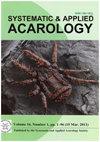Diet restriction in parents shapes the lives of their offspring: a laboratory study using a predatory mite (Acari: Phytoseiidae)
IF 1.2
3区 农林科学
Q2 ENTOMOLOGY
引用次数: 0
Abstract
Environmental influences experienced by organisms are known to influence the phenotype of offspring through transgenerational plasticity or parental effects, and recent studies have revealed the significance of diet stress experienced by parents in shaping the life course of their progeny. In this laboratory study using a predatory mite, Phytoseiulus persimilis Athias-Henriot, we investigated the influence of parental diet restriction on offspring life history traits. We found that parental mites exposed to food reductions of 50% (Low diet) during both immature development and adult stages produced F1 offspring with reduced survival rates and fecundity compared to those from parents on abundant (High) diets. Sexually dimorphic responses emerged in response to parental diet restriction, whereby a reduced diet led to extended developmental periods for both male and female offspring while simultaneously reducing male size at maturity and increasing female size at maturity. We also found that diet restriction experienced by F0 individuals at both immature and adult stages manifested as reduced egg volumes and a less female-biased sex ratio in the F1’s offspring (i.e. the F2). There were additional significant interactions between the dietary history of parents and the dietary experiences of P. persimilis offspring themselves on various traits, including post-oviposition period, fecundity, and individual egg volume. These findings suggest that the dietary experiences of parents can modulate their offspring’s response when facing diet restriction. This study provided insights into non-genetic inheritance and transgenerational plasticity, highlighting the intricate interplay between environmental stressors and phenotypic responses.亲代的饮食限制影响后代的生活:利用捕食螨(螨科:Phytoseiidae)进行的实验室研究
众所周知,生物所经历的环境影响会通过跨代可塑性或亲代效应影响后代的表型,最近的研究揭示了亲代所经历的饮食压力在塑造后代生命历程中的重要作用。在本实验室研究中,我们利用捕食螨Phytoseiulus persimilis Athias-Henriot,研究了亲代饮食限制对子代生活史特征的影响。我们发现,亲螨在未成熟发育和成螨期的食物摄入量减少50%(低摄入量),与摄入丰富食物(高摄入量)的亲螨相比,其F1后代的存活率和繁殖率都会降低。对亲本饮食限制的反应出现了性别二态性,即饮食减少导致雄性和雌性后代的发育期延长,同时雄性后代成熟时体型缩小,而雌性后代成熟时体型增大。我们还发现,F0个体在未成年和成年阶段所经历的饮食限制表现为F1后代(即F2)的卵量减少和性别比偏向于雌性。亲本的膳食史与后代的膳食经历对各种性状(包括卵胎生后时期、繁殖力和个体卵量)的影响也有明显的交互作用。这些研究结果表明,亲代的饮食经历可以调节子代在面临饮食限制时的反应。这项研究为非遗传和跨代可塑性提供了见解,突出了环境压力和表型反应之间错综复杂的相互作用。
本文章由计算机程序翻译,如有差异,请以英文原文为准。
求助全文
约1分钟内获得全文
求助全文
来源期刊

Systematic and Applied Acarology
ENTOMOLOGY-
CiteScore
2.20
自引率
33.30%
发文量
152
期刊介绍:
Systematic and Applied Acarology (SAA) is an international journal of the Systematic and Applied Acarology Society (SAAS). The journal is intended as a publication outlet for all acarologists in the world.
There is no page charge for publishing in SAA. If the authors have funds to publish, they can pay US$20 per page to enable their papers published for open access.
SAA publishes papers reporting results of original research on any aspects of mites and ticks. Due to the recent increase in submissions, SAA editors will be more selective in manuscript evaluation: (1) encouraging more high quality non-taxonomic papers to address the balance between taxonomic and non-taxonomic papers, and (2) discouraging single species description (see new special issues for single new species description) while giving priority to high quality systematic papers on comparative treatments and revisions of multiple taxa. In addition to review papers and research articles (over 4 printed pages), we welcome short correspondence (up to 4 printed pages) for condensed version of short papers, comments on other papers, data papers (with one table or figure) and short reviews or opinion pieces. The correspondence format will save space by omitting the abstract, key words, and major headings such as Introduction.
 求助内容:
求助内容: 应助结果提醒方式:
应助结果提醒方式:


